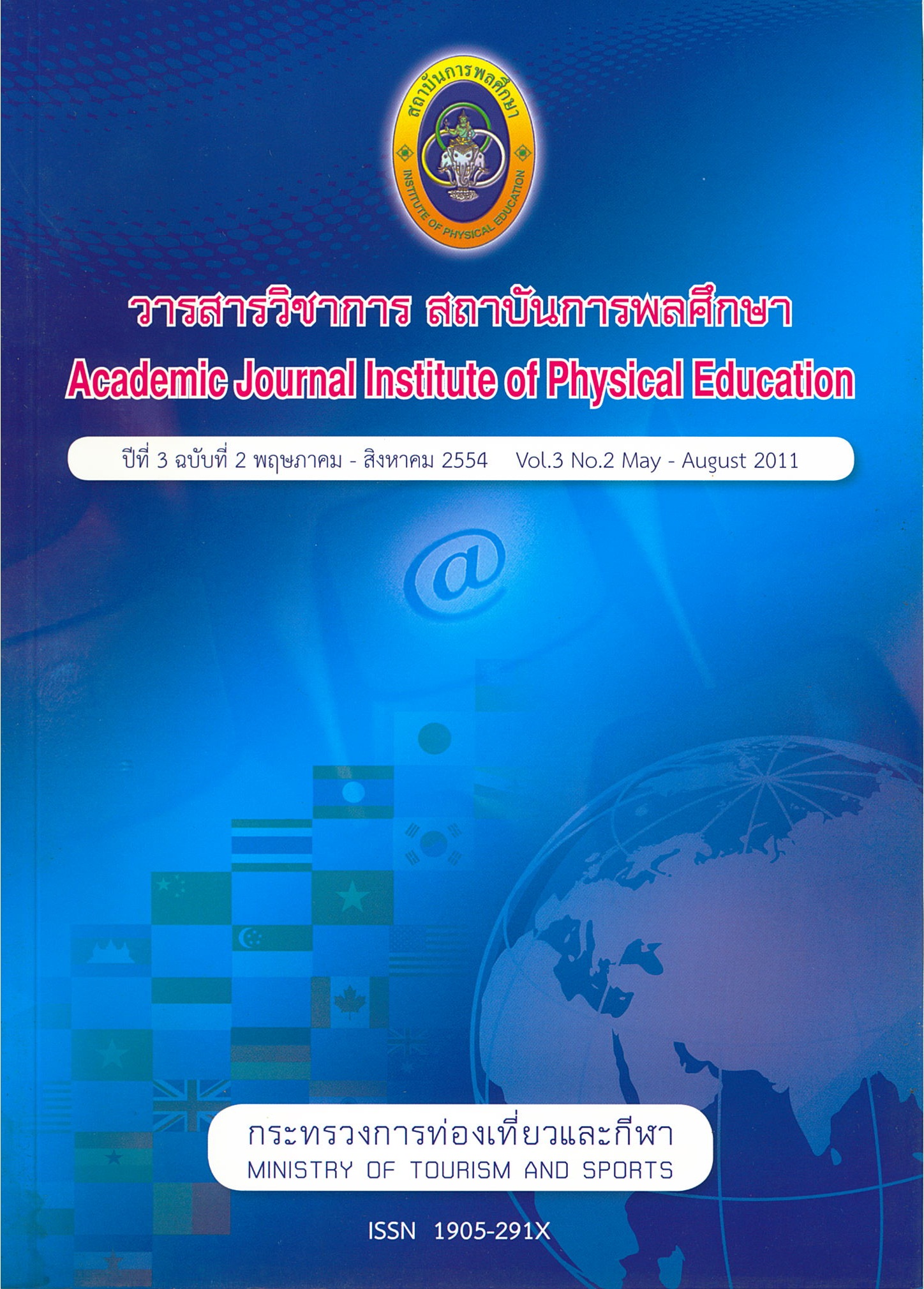สมรรถนะของนักศึกษาสถาบันการพลศึกษา วิทยาเขตภาคเหนือ ด้วยประบวนการอยู่ค่ายพัก
Main Article Content
Abstract
The purpose of this research were to study about the capacity of physical education students of the Institute of Physical Educations in northern campus and find a guideline to develop students capacity.
The tools was capacity assessment and collecting data from the samples who were 320 students in the fourth year from 4 physical education students of the Institute of Physical Educations in northern campus. Then, the capacity assessment were sent back 284 items or 88.75 percent and the obtained data were analyzed by SPSS program : percentage , mean ,standard deviation and Oneway ANOVA
The results found that The sample group of the fourth year students from 4 physical education students of the Institute of Physical Educations in northern campus were male 67.3%. From Chiang Mai campus students were 43.66 %, Sukhothai campus students were 32.39% and most of them were from Physical education program in the faculty of Education, the faculty of Sports Sciences and the faculty of Liberal Arts respectively. They had grade point average around 2.01-3.00. Their main roles were firstly studying and participating sports activities 81.3%.Secondly, participating important day activities without academic work or professional work 72.9 %. Thirdly, 14.1% of students had academic work or professional work. Fourthly, students didn't want to self-develop and develop the organization 52.5%. Fifthly, 39.8 % of students want to self-develop and develop the organization and lastly, 68.3% of students had their life planning.
Three main capacities were knowledge part, skill part and personal characters found that the overview were fair. Besides, personal characters for good model behaviors such as manners convention from society, the gratitude, the honesty, the kindness, the justice and professional responsibility of their promoting careers were good. When considering the total results of each capacity from 4 campuses shown that it were not differed in .05 at statistical significant.
Article Details
The published article is a copyright of the Academic Journal of Thailand National Sports University. The passage appeared in each article in this academic journal is a perspective of each author which is not related to the journal. Each author is required to be responsible for all components of his/her own article. If there are any mistakes, each author must be responsible for those mistakes on his/her own.
References
กระทรวงมหาดไทย. (2549). เอกสารความรู้เรื่องสมรรถนะและการกําหนดสมรรถนะประจําตําแหน่งปลัดอําเภอ กรมการปกครอง กระทรวงมหาดไทย. กรุงเทพฯ : อัดสําเนา.
กองวิจัยทางการศึกษา กรมวิชาการกระทรวงศึกษาธิการ (2542). การศึกษาศักยภาพของเด็กไทยกรุงเทพ : โรงพิมพ์การศาสนา.
จันทนา อิสลาม. (2545). ศึกษาความคิดเห็นของอาจารย์และนักศึกษาพยาบาลเกี่ยวกับสมรรถนะของนักศึกษาพยาบาลศาสตร์ หลักสูตรพยาบาลศาสตร์บัณฑิต. นครศรีธรรมราช : วิทยาลัยพยาบาลบรมราชชนนี.
ฐิติมา อัศวพรหมธาดา และคณะ. (2552). การศึกษาสมรรถนะที่พึงประสงค์ของนักศึกษาสหกิจศึกษาจากสถานประกอบการภาคอุตสาหกรรม. วารสารวิชาการเทคโนโลยีอุตสาหกรรม ปีที่ 5 ฉบับที่ 2 กรกฎาคม-ธันวาคม 2552: ภาควิชาการจัดการเทคโนโลยีการผลิตและสารสนเทศ วิทยาลัยเทคโนโลยีอุตสาหกรรม มหาวิทยาลัยเทคโนโลยีพระจอมเกล้าพระนครเหนือ.
เทือน ทองแก้ว. (2550). สมรรถนะ : หลักการและแนวปฏิบัติ, กรุงเทพฯ : มหาวิทยาลัยราชภัฏสวนดุสิต.
ประจักษ์ ทรัพย์อุดม.(2550). แนวทางพัฒนาทรัพยากรมนุษย์ด้วย Competency. กรุงเทพฯ : เอกสารอัดสําเนา.
เพียรพันธุ์ กิจพาณิชย์เจริญ. (2552). สมรรถนะการบริหารวิชาการของผู้บริหารสถานศึกษา. กรุงเทพฯ : สารนิพนธ์ กศม.บัณฑิตวิทยาลัยศรีนครินทรวิโรฒน์.
ไพรวัลย์ โคราช 1. Posten by on March 18}2010 at 2:39pm.
บุปผชาติ ทัททิกรณ์, สมรรถนะสําคัญของผู้เรียน, Kruthai. Socialgo.com/Forum/topi/72
เมธัส วันทอเลาะ. (2552). ปัจจัยที่สัมพันธ์ต่อสมรรถนะของครูโรงเรียนสอนศาสนาอิสลาม ในระดับมัธยมศึกษา เขตกรุงเทพฯ และปริมณฑล, กรุงเทพฯ : แผนกงานบริหารงานคณะกรรมการศึกษาเขตกรุงเทพและปริมณฑล.
เรมวล นันท์ศุภวัฒน์ และอรอนงค์วิชัยคํา : Nursing Journal Volume 35 Number 2 April June 2008.
สถาบันการพลศึกษา กระทรวงการท่องเที่ยวและกีฬา. (2548). หลักสูตรสถาบันการพลศึกษาระดับปริญญาตรี 2548. กรุงเทพฯ : โรงพิมพ์องค์การรับส่งสินค้าและพัสดุภัณฑ์.
สุกัญญา รัศมีธรรมโชติ, (20447), “Competency : เครื่องมือการบริหารที่ปฏิเสธไม่ได้” l Productivity. 9(53) (พ.ย.-ธ.ค.) : 44-48.
สุชาดา บวรกิติวงศ์. (2548), สถิติประยุกต์ทางพฤติกรรมศาสตร์, กรุงเทพฯ : โรงพิมพ์จุฬาลงกรณ์มหาวิทยาลัย.
สุรางค์ โควตระกูล. (2541) จิตวิทยาการศึกษา กรุงเทพฯ : จุฬาลงกรณ์มหาวิทยาลัย.
สํานักงานคณะกรรมการพัฒนาเศรษฐกิจและสังคมแห่งชาติ, แผนพัฒนาเศรษฐกิจและสังคมแห่งชาติ ฉบับที่ 10 (พ.ศ. 2550-2554). Available online at http://www.nesdlo.go.th/Default.aspx?tabid=139
สํานักงานมาตรฐานและประเมินผลอุดมศึกษา. (2549), มาตรฐานและประเมินผลอุดมศึกษา. กรุงเทพฯ: คุรุสภาลาดพร้าว.
สํานักงานคณะกรรมการข้าราชการพลเรือน. (2547). การปรับใช้สมรรถนะในการบริหารทรัพยากรมนุษย์, เอกสารประกอบการสัมมนาเรื่องสมรรถนะของข้าราชการ เมื่อวันที่ 31 มกราคม 2547.
สํานักงานทดสอบทางการศึกษา กรมวิชาการ กระทรวงศึกษาธิการ. (2545). การประกันคุณภาพการศึกษา ภายในสถานศึกษา. กรุงเทพฯ : โรงพิมพ์คุรุสภาลาดพร้าว.
อาภารณ์ ภู่วิทยพันธุ์. (2548). Competency Dictionary. กรุงเทพฯ : เอช อาร์ เซนเตอร์.
อานนท์ ศักดิ์วรวิชญ์. (2547). “แนวคิดเรื่องสมรรถนะ Competency : เรื่องเก่าที่เรายังหลงทาง”, Chulalongkorn Review. 16 (ก.ค.-ก.ย.) : 57-72.
อเนกลาภ สุทธินันท์ (2548). แนวทางการนําสมรรถนะทั้ง 5 ไปเพิ่มประสิทธิภาพ การปฏิบัติงานอย่างได้ผล, กรุงเทพฯ : อัดสําเนา.
McClelland, D.C.(1973). Test for Competence, rather than intelligence. American Psychologists. Vol.17 No. 7 P.57-83.
Spencer and Spencer. (1993). Competency at Work: Model for Superior Performance. New york : Wily & Sons.
http://www.tpa.or.thhttp://www.oknation.net/blog/print.php?d=29662
http://woozoo.multiplay.com/reviwes
www.ipe.ac.th
http://www.coolpoyblogspot.com/2009/05/student.comptencies.html
www.ipecm.ac.th

